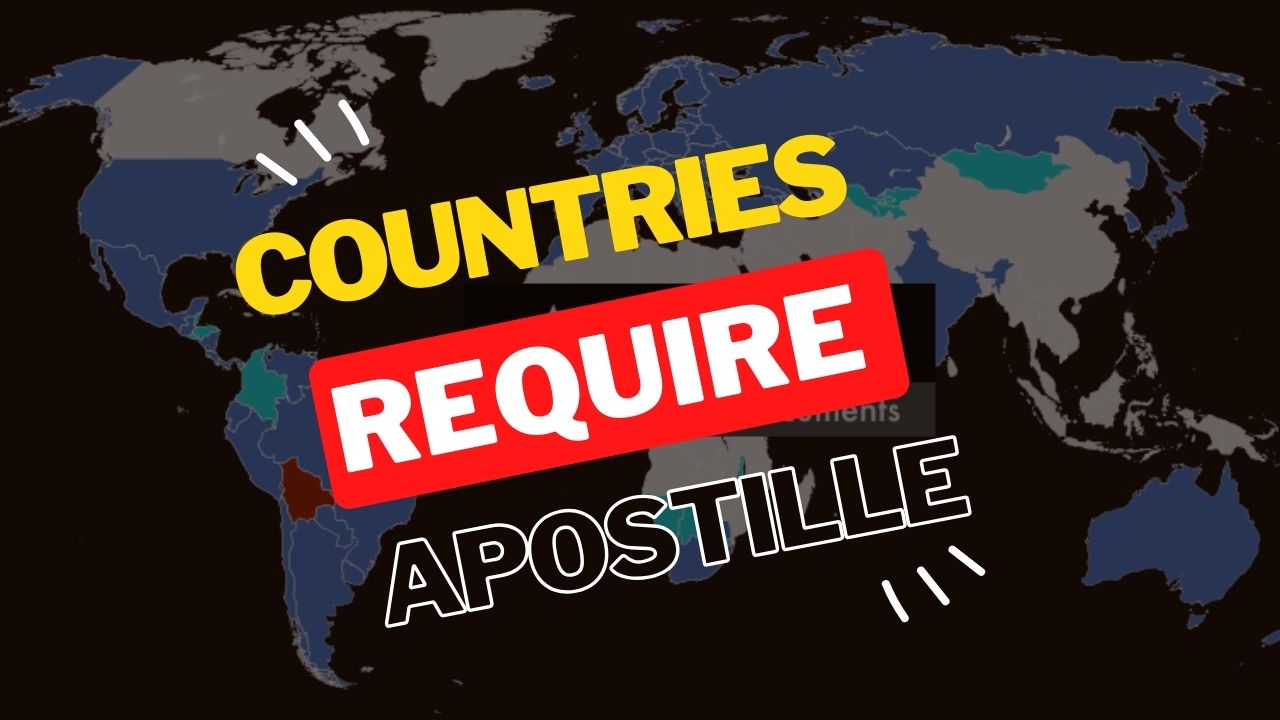If you need to use official public documents from your home country abroad, you may require something called an apostille to have them recognized as valid. An apostille is a specific type of authentication that allows documents issued in one member country of the Hague Convention to be legally used in another member country. But not every country around the world requires or recognizes apostilles.
Do you know if the country you intend to use your birth certificate, degree certificate or other documents in participates in the apostille convention? Which government authorities are responsible for issuing apostilles? What exactly does the apostille process involve? Read on for a complete guide on which countries will require your documents to be apostilled, how to obtain an apostille, and alternative options if your documents cannot be apostilled.
An apostille is a form of authentication issued for public documents used in countries that participate in the Hague Convention of 1961. An apostille certifies the authenticity of the signature, the capacity in which the person signing the document has acted and identifies the seal/stamp on the document.
Having a document apostilled allows it to be recognized as valid in any other participating country, without further authentication needed. These speeds up the process and reduces bureaucracy when using public documents abroad for purposes such as:
- Birth, marriage, or death certificates for legal procedures
- Education documents for academic or employment purposes
- Commercial documents for business transactions
- Affidavits, powers of attorney and other legal documents
But which countries require an apostille to recognize foreign public documents? Here is a complete guide to which countries need an apostille and how to get a document apostilled for that country.
What is an Apostille?
Before diving into which countries require apostilles, let’s recap what an apostille is.
An apostille is a specific form of authentication issued by a designated authority in countries that are members of the Hague Convention. The Hague Convention abolished the requirement for diplomatic legalization of documents used in other member countries.
Instead, a single standard form of authentication – the apostille – is sufficient.
The key functions of an apostille are:
- It certifies the authenticity of the signature on the document.
- It certifies the capacity in which the person signing the document has acted.
- It identifies the seal/stamp on the document.
This allows the document to be recognized as valid in any other country that is party to the Hague Convention, without needing further legalization.
The apostille is attached to the original document itself. There are strict requirements around the format and content of apostilles globally.
Countries Requiring Apostilles for Recognition of Foreign Public Documents
There are currently 117 countries that are members of the Hague Convention and recognize apostilles on public documents issued in other member countries.
Here is a list of all the countries that require public documents to be apostilled in order to be considered valid:
Europe
- Albania
- Andorra
- Armenia
- Austria
- Azerbaijan
- Belarus
- Belgium
- Bosnia and Herzegovina
- Bulgaria
- Croatia
- Cyprus
- Czech Republic
- Denmark
- Estonia
- Finland
- France
- Georgia
- Germany
- Greece
- Hungary
- Iceland
- Ireland
- Italy
- Latvia
- Lithuania
- Luxembourg
- Malta
- Moldova
- Monaco
- Montenegro
- Netherlands
- North Macedonia
- Norway
- Poland
- Portugal
- Romania
- Russia
- San Marino
- Serbia
- Slovakia
- Slovenia
- Spain
- Sweden
- Switzerland
- Turkey
- Ukraine
- United Kingdom
Americas
- Argentina
- Antigua and Barbuda
- Bahamas
- Barbados
- Belize
- Bolivia
- Brazil
- Chile
- Colombia
- Costa Rica
- Dominica
- Dominican Republic
- Ecuador
- El Salvador
- Grenada
- Honduras
- Mexico
- Nicaragua
- Panama
- Paraguay
- Peru
- Saint Kitts and Nevis
- Saint Lucia
- Saint Vincent and the Grenadines
- Suriname
- Trinidad and Tobago
- Uruguay
- USA
- Venezuela
Middle East
- Israel
- Kazakhstan
- Kyrgyzstan
- Oman
- Turkey
- Uzbekistan
Africa
- Lesotho
- Liberia
- Namibia
- Sao Tome and Principe
- South Africa
- Swaziland
Asia Pacific
- Australia
- Cook Islands
- Fiji
- India
- Japan
- Republic of Korea
- Marshall Islands
- Mauritius
- New Zealand
- Niue
- Samoa
- Seychelles
- Tonga
- Vanuatu
Which Countries DO NOT Require Apostilles?
Not all countries around the world require apostilles. There are a number of countries that are NOT members of the 1961 Hague Convention.
Public documents being used in these countries may need to go through a more complex process of diplomatic or consular legalization.
Here are some of the major countries that do NOT participate in the apostille convention and generally require full legalization of foreign public documents:
- China
- Indonesia
- Pakistan
- Philippines
- Thailand
- Iraq
- Iran
- Egypt
- Ethiopia
- Saudi Arabia
- Taiwan
- Vietnam
- United Arab Emirates
However, some non-member countries have special agreements with certain countries to recognize apostilles or simplifying document legalization. It’s important to check the requirements between specific country pairs before assuming legalization is required.
For example, China has agreements with New Zealand and Australia to recognize apostilles on certain documents. And many Arab states accept public documents legalized by the UAE Ministry of Foreign Affairs.
How to Get a Document Apostilled for Each Country
The process of getting an apostille may vary slightly between countries. But in general these are the steps:
1. Prepare Original Document
Ensure you have the original signed document. Photocopies and scanned copies cannot be apostilled.
Common documents include birth certificates, marriage certificates, degrees, diplomas, affidavits, powers of attorney, articles of incorporation, etc.
The document also needs relevant signatures and seals to be considered authentic in the country of origin.
2. Authenticate the Origin
In most countries, you need get the document certified by the relevant government agency or authority in the country it originated from.
For example, birth certificates may need to be certified by the health department, degrees by the university or education department etc.
This verifies the document is valid and confirms the identity/authority of the signing person.
3. Apply for the Apostille
Each government has designated ‘Competent Authorities’ that can issue apostilles. This is often the foreign affairs department or a justice/attorney general’s office.
You apply to the relevant competent authority providing the original document. Apostille request forms need to be completed with all relevant details.
4. Attach and Use the Apostille
The competent authority will attach the physical apostille to the document, with ribbon and a wax seal.
The document is now ready to be used as valid in any country party to the Hague Convention.
Let’s look at country-specific guides on how & where to get documents apostilled.
Getting an Apostille in the United States
In the US, the Secretary of State offices for each individual state are the Competent Authorities that can issue apostilles.
The process works as:
- Get your original document certified by the relevant government agency (e.g. County Clerk for birth certificates)
- Submit the certified document to the Secretary of State office in the relevant state
- Complete the apostille request form and pay the fee.
- The Secretary of State will attach the apostille and seal/ribbons
- Use the apostilled document in your foreign country.
The US State Department maintains a directory listing details for all Secretary of State offices to apply for an apostille.
Can’t Get an Apostille? Alternatives for Non-Member Countries
If an apostille can’t be issued because your country or the foreign country is not part of the convention, you’ll need your documents fully legalized instead.
Here is the usual process for legalization:
1. Certify the Document
Get the original document certified by the appropriate government agency or authority in the country of origin.
2. Authentication by Ministry of Foreign Affairs
Submit the certified document to the Ministry of Foreign/External Affairs for legalization in your home country.
3. Legalization by Embassy/Consulate
Take your document legalized by the Ministry to the embassy/consulate of the foreign country and get it legalized again.
Some countries may require additional levels of legalization before the embassy as well.
This 3+ step procedure replaces the single step apostille process. It proves time consuming and bureaucratic. Hence why membership of the apostille convention is so beneficial for streamlining recognition of foreign public documents.
Frequently Asked Questions About Apostilles
Here are answers to some common questions about getting documents apostilled and using apostilles abroad:
1. Can I use an apostilled document anywhere in the world?
No, apostilles are only valid in the 117 member countries of the Hague Convention.
2. Do I need an apostille for private documents?
No, only public documents require an apostille if you will use them overseas. Private documents like personal references or transcripts may need regular notarization but not an apostille.
3. What information is contained in the apostille?
The apostille certificate will include:
- Country issuing the apostille
- Name and capacity of the person who signed the document
- Confirmation the signature is authentic
- The identity of the seal/stamp on the document
- Registry number for that apostille
- Details of the issuing authority
4. How long is an apostille valid for?
An apostille remains valid indefinitely as long as the underlying document remains valid. Apostilles have no expiration date.
5. Does getting a document notarized make it apostilled?
No, notarization is different from an apostille. Notarization just certifies the identity of the person signing. An apostille is a specific authentication that makes the document valid internationally.
6. Can I get an apostille for my driving license or passport?
No, apostilles are only for public documents like birth certificates or university degrees. Passports, ID cards and drivers licenses don’t need apostilles.
Hopefully this complete guide has helped explain clearly which countries will require your documents to be apostilled!

